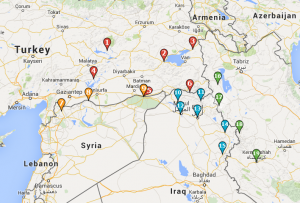- 1 Phonology
- Phonology 1
- Phonology 2
- 1.11 Final consonant in ‘did/done’
- 1.12 Liquid consonant in ‘home’
- 1.13 Liquid consonant in ‘high’
- 1.14 Liquid consonant in ‘rich
- 1.15 Liquid consonant in ‘child’
- 1.16 Dental affricate in ‘anything’, ‘girl’
- 1.17 Final cluster in ‘mosque’
- 1.18 Final cluster in ‘seven’
- 1.19 Final cluster in ‘fell’
- 1.20 Initial consonant cluster in ‘language’
- Phonology 3
- 1.21 Cluster /nd/ reduction in ‘child’
- 1.22 Cluster /nd/ reduction in ‘rich’
- 1.23 Metathesis in ‘snow’
- 1.24 Pharyngeal retention/substitution in ‘Arab’
- 1.25 Pharyngeal retention/substitution in ‘clan, tribe’
- 1.26 Pharyngeal substitution
- 1.27 Pharyngeal retention in ‘animal’
- 1.28 Pharyngeal acquisition in ‘eight’
- 1.29 Pharyngeal acquisition in ‘seven’
- 1.30 Pharyngeal acquisition in ‘all’
- Phonology 4
- 2 Lexicon and lexico-phonology
- 3 Morphology
- Morph 1
- 3.1.1 Definiteness singular: The book is on the table’
- 3.1.2 Definiteness plural: ‘If the children go to sleep early their mother will give them candies’
- 3.2.1 Masculine subject in past-tense transitive: ‘The man was pulling the donkey’
- 3.2.2 Feminine subject in past-tense transitive: ‘The woman broke the glass’
- 3.2.3 Plural subject in past-tense transitive: ‘The men built the house’
- 3.3 Partitive direct object: ‘Bring some bread’
- 3.4.1 Marking of direct object: ‘I know the town’
- 3.4.2 Definite direct object: ‘I know the town’
- 3.4.3 Combination: ‘I know the town’
- 3.5.1 Marking of indirect object: ‘I didn’t go to the town’
- 3.5.2 Definite directional object: ‘I didn’t go to the town’
- 3.5.3 Combination: ‘I didn’t go to the town’
- Morph 2
- 3.6.1 Animate directional object: ‘I went to the doctor’
- 3.6.2 Inanimate directional object: ‘He went to Erbil’
- 3.7 Case marking of definite feminine possessor: ‘The girl’s mother’
- 3.8.1 Determiner, masculine direct object: ‘I know this man’
- 3.8.2 Determiner, feminine direct object: ‘I know this woman’
- 3.9.1 3SG inflection, present indicative
- 3.9.2 3SG present subjunctive: ‘The woman also wanted to sing’
- 3.9.3 3SG inflection, future: ‘Tomorrow it will rain’
- 3.10.1 Present indicative marker: ‘I eat’
- 3.10.2 Present indicative marker: ‘I know his name’
- Morph 3
- Morph 1
- 4 Morpho-syntax
- Morphsyn 1
- 4.1.1 Gender distinction in nominal attribution (Izafe)
- 4.1.2 Plural nominal attribution (Izafe): ‘The mountains of Kurdistan are high’
- 4.1.3 Possessive: ‘My mother’
- 4.1.4 Possessive: ‘My father’
- 4.1.5 Possessive: ‘My (house)’
- 4.1.6 3SG possessive: ‘I know his name’
- 4.1.7 Reflexive possessive: ‘I finished my work’
- 4.2.1 Passive present: ‘(They) are killed’
- 4.2.2 Passive past: ‘(He) was arrested’
- 4.2.3 Causative future: ‘I will make you carry these bags’
- 4.3.1 Relative clause marker
- Morphsyn 2
- 4.3.2 Structure of consequence in realis conditional clause
- 4.3.3 Structure of irrealis conditional clause
- 4.3.4 Co-referential 1SG subject in past-tense intransitive-transitive complex clause
- 4.4.1 Agreement: ‘I saw my friends’
- 4.4.2 Agreement: ‘You.SG saw your friends’
- 4.5.1 Agreement: ‘He saw them’
- 4.5.2 Agreement: ‘They saw them’
- 4.5.3 Agreement: ‘You.PL saw them’
- 4.6.1 Agreement: ‘I saw them’
- 4.6.2 Agreement: ‘I didn’t see them’
- 4.7.1 Agreement: ‘I saw you.PL’
- 4.7.2 Agreement: ‘I didn’t see you.PL’
- Morphsyn 3
- 4.8.1 Agreement: ‘You.PL saw me’
- 4.8.2 Agreement: ‘You.PL didn’t see me
- 4.9.1 Agreement: ‘You.SG saw us’
- 4.9.2 Agreement: ‘You.SG didn’t see us’
- 4.10.1 Agreement: ‘I didn’t see him’
- 4.10.2 Agreement: ‘He didn’t see me’
- 4.11.1 Agreement: ‘You.PL gave it to me’
- 4.11.2 Agreement: ‘You.PL didn’t give it to me’
- 4.12.1 Agreement: ‘I didn’t give it to him’
- 4.12.2 Agreement: ‘He didn’t give it to me’
- Morphsyn 1

